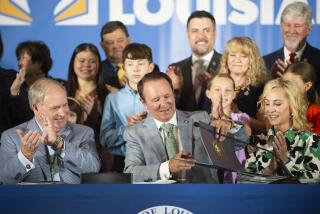Justices Turn Away Voucher Appeal
WASHINGTON â The Supreme Court, in a setback for advocates of school vouchers, turned down the legal claim Tuesday that a state must include religious schools if it subsidizes students attending private schools.
The justices let stand an unusual Maine law that pays for students in small towns without high schools to go to public or private schools at state expense. The law excludes parochial schools from the tuition-subsidy program.
The Supreme Court outcome adds a new wrinkle to the continuing legal debate over schools.
Several recent cases have tested the 1st Amendmentâs ban on laws ârespecting an establishment of religion.â The justices no longer say that this clause demands strict separation between church and state.
But though the conservative high court has given the government more leeway in aiding religious schools, it is apparently unwilling to require government aid for church-related schools, even when private education is subsidized.
Last year, the court ruled that federal funds could be used to send public school teachers into parochial schools to tutor low-achieving students. The justices also refused to block a Wisconsin voucher program that pays the cost of sending children from low-income families to private or parochial schools. Last week, the court turned away a challenge to Arizona law that gives tax credits for those who donate money to private and parochial schools.
In the Maine case, lawyers for Pat Robertsonâs American Center for Law and Justice and the Washington-based Institute for Justice asked the court to go one step further. They said that the government must include religious schools on the same basis as other private schools in a voucher program. Otherwise, the government would be discriminating against religion, they said.
But both the U.S. Court of Appeals in Boston and the Maine Supreme Judicial Court had rejected that contention and ruled that the Constitution does not require equal treatment for religious schools.
Maineâs education officials had noted that the Supreme Court has ânever suggested that the exercise of religious rights requires public subsidization.â
Nonetheless, the voucher advocates appealed the issue to the high court in July. Their claims were turned down without comment Tuesday (Bagley vs. Raymond School District, 99-163, and Strout vs. Albanese, 99-254).
The next major test on religion is to come before the court on Dec. 1. The justices will take up a Louisiana case to decide whether federal funds can be sent to parochial schools to pay for computers.
Congress and the Clinton administration support this form of aid to church-related schools but a U.S. court of appeals in New Orleans struck down the program as a 1st Amendment violation. The pending case is Mitchell vs. Helms, 98-1648.
In still another religion case (Pennsylvania vs. Newman, 99-154), the justices refused Pennsylvaniaâs request Tuesday to revive a state sales tax exemption for âreligious publications.â
Ten years ago, the high court struck down such exemptions as giving favored treatment to religion. Pennsylvaniaâs courts followed that reasoning in striking down its sales tax exemption.
Meanwhile on Tuesday, the court agreed to hear four new cases, heard arguments in an important environmental case and denied appeals in several dozen other cases.
In these other cases, the court:
* Will consider whether to revive tax-cheating charges against Clinton friend Webster L. Hubbell by independent counsel Kenneth W. Starr (United States vs. Hubbell, 99-166). At issue is whether Hubbell could be forced to turn over his business records under a grant of immunity and then be indicted on tax charges that are based on those records.
* Rejected a Georgia murdererâs claim that he had a right to a state-funded lawyer to represent him in a second round of appeals (Gibson vs. Turpin, 99-77).
All states must provide lawyers for criminal defendants during their trials and initial appeals and all but Georgia pay for lawyers during the second round of state appeals
At age 17, Exzavious Gibson stabbed a local grocer 39 times and robbed him of $500. Gibson confessed when police found him hiding with the money in his bedroom and he was later sentenced to death.
During a second round of appeals, he wanted to argue that his trial lawyer had failed him. The federally funded Georgia Resource Center filed a written appeal on his behalf but it could not find a lawyer to represent him at his hearing before a judge.
The hearing took place anyway and his claim was rejected. The Georgia Supreme Court later ruled that his trial lawyer had been adequate and, on a 4-3 vote, ruled that his rights had not been violated by the stateâs failure to provide him with a new lawyer.
Without comment, the justices refused to hear his further appeal.
* Refused again to hear a gun ownerâs claim that the 2nd Amendment creates a personal right to âbear arms.â Though many scholars and historians say that the amendment was intended to do just that, the Supreme Court in 1939 said that its purpose was to preserve âa well-regulated [state] militia.â Since then, the justices have refused to reconsider the issue.
The justices turned down appeals from two Louisiana hunters who were barred from purchasing rifles because they had been convicted of federal tax felonies (Kostmayer vs. Department of the Treasury, 99-71).
More to Read
Get the L.A. Times Politics newsletter
Deeply reported insights into legislation, politics and policy from Sacramento, Washington and beyond. In your inbox three times per week.
You may occasionally receive promotional content from the Los Angeles Times.











